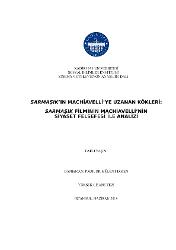| dc.contributor.advisor | Diken, Bülent | en_US |
| dc.contributor.author | Yasin, Fatih | |
| dc.date.accessioned | 2019-07-12T08:42:58Z | |
| dc.date.available | 2019-07-12T08:42:58Z | |
| dc.date.issued | 2018 | en_US |
| dc.identifier.uri | https://hdl.handle.net/20.500.12469/2590 | |
| dc.description.abstract | Bu çalışma yönetmen Tolga Karaçelik’in 2015 yılında çektiği Sarmaşık filmini bir Rönesans dönemi düşünürü olan Niccolo Machiavelli’nin siyaset felsefesi ile beraber analiz etmektedir. Bir gemide mahsur kalan altı insanın sınırlı kaynaklarla geçirdikleri günleri anlatan film, egemenlik, otorite ve yönetim hakkında düşünmeye imkân sağlamaktadır. Kaptanın gemisini yönetmeye ve egemenliğini korumaya çalışması, Machiavelli’nin devlet yönetimine ve egemenliğin korunmasına dair fikirleri ışığında incelenmiş ve filmin temasının Machiavelli’nin siyaset teorisiyle benzerlikleri ve farkları ele alınmıştır. Bu çalışmada Machiavelli’nin siyaset bilimsel teorik analizi ve film analiz metotları kullanılarak Machiavelli’nin siyaset teorisi ile Sarmaşık filmi karşılıklı bir okumaya tabi tutulmuştur. Çalışma neticesinde varılan sonuç Sarmaşık filminin anlatısı ile özelde Machiavelli’nin siyaset felsefesinin genelde ise sosyal teorilerin sinema ile birlikte ele alınıp yeni bir eleştirel alan açtığıdır. | en_US |
| dc.description.abstract | This research analyzes Sarmaşık (Tolga Karaçelik, 2015) and Niccolo Machiavelli’s
political philosophy together. Sarmaşık narrates six men’s days with insufficient food
and resource in an anchored cargo ship. This film provides an opportunity to thinking
about sovereignty, authority and management. The Captain’s effort for trying to manage
his ship and protect his sovereignty are analyzed in the light of Machiavelli’s ideas
about state management and protecting sovereignty. By this means similarities and
differences between the themes of the Sarmaşık and Machiavelli’s political theories are
addressed. In this research, Machiavelli's political theory and Sarmaşık were subjected
to a mutual reading using Machiavelli's political scientific theoretical analysis and film
analysis methods. The conclusion reached in the context of the research is that
Sarmaşık's narrative and Machiavelli's political philosophy in particular, social theories
in general, have been taken up with cinema and opened a new critical field. | en_US |
| dc.language.iso | tur | en_US |
| dc.publisher | Kadir Has Üniversitesi | en_US |
| dc.rights | info:eu-repo/semantics/openAccess | en_US |
| dc.subject | Sarmasik film | en_US |
| dc.subject | Sinema | en_US |
| dc.subject | Machiavelli | en_US |
| dc.subject | Siyaset Bilimi | en_US |
| dc.subject | Tolga Karaçelik | en_US |
| dc.subject | Sarmaşık (Ivy) | en_US |
| dc.subject | Cinema | en_US |
| dc.subject | Political Philosophy | en_US |
| dc.title | Sarmaşık’in Machiavelli’ye uzanan kökleri : Sarmaşık filminin Machiavelli’nin siyaset felsefesi ile analizi | en_US |
| dc.type | masterThesis | en_US |
| dc.department | Enstitüler, Lisansüstü Eğitim Enstitüsü, Radyo, Televizyon ve Sinema Ana Bilim Dalı | en_US |
| dc.relation.publicationcategory | Tez | en_US |
| dc.identifier.yoktezid | 529559 | en_US |
















